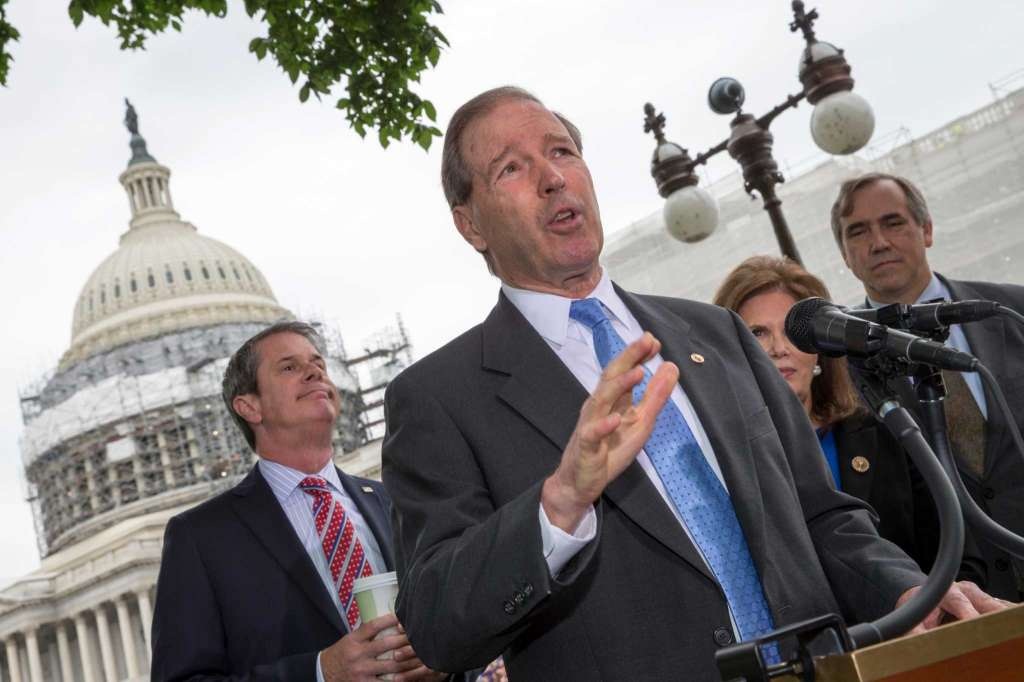This post was authored by HEFN Program Director Jeff Wise.
On June 7, Congress passed the Frank R. Lautenberg Chemical Safety for the 21st Century Act, potentially the most important new, non-energy-related environmental law in a generation. Whether this reform of the forty-year-old Toxic Substances Control Act (TSCA) meaningfully reduces the hazards to people and wildlife from tens of the thousands of untested chemicals on the market will depend on how effectively the EPA implements it.

Senators Lautenberg and Boxer. Image Source: Associated Press.
The new law is the result of years of painstaking work by advocates and funders. Whatever you think of it, its passage represents a major milestone for environmental health funding and advocacy.
Unlike the original TSCA, which allowed industry multiple avenues for blocking action, the new law gives EPA an enforceable mandate to review and regulate chemicals, based on their impact on human health. But it also contains some rollbacks to current law, such as preempting some state actions on toxics and constraining EPA’s ability to monitor chemicals in imported products. It will take several years before it’s clear how effective this new law will be in practice.
Major Milestone of a Multi-Year Commitment
Funders launched a decade-long strategic collaboration in 2004 to reform TSCA, through a HEFN-hosted “Catalysts Collaborative.” Foundations and NGOs together built field capacity in policy, markets, science, and community organizing. Many advocates worked on corporate campaigns building consumer awareness and pressure on companies to remove dangerous substances from their products. State-based policy campaigns built policy models, momentum, and a substantial record of wins in 34 states. Researchers expanded knowledge about chemical exposures on health and human development. And organizing across many communities and constituencies helped weave state, market, and science contributions into a national campaign for federal policy reform. The campaign’s analysis of the new law can be found here.
The last ten-plus years of advocacy drove the industry to the negotiating table and Congress into legislating. While the new law is one significant outcome, other outcomes include greater public, policymaker, and business awareness about toxic chemicals as well as stronger field capacity.
What Remains to be Done
This field capacity, built over the last decade, should provide a critical foundation for fighting regulatory and other battles ahead. HEFN, the Environmental Grantmakers Association, and Rachel’s Network will shortly be hosting a national funders webinar on this challenge. Meanwhile, HEFN members already are focused on next steps to protect people and wildlife from toxics. Several have commissioned a HEFN-supervised evaluation of the last ten-plus years of advocacy work to reform TSCA, as well as an assessment of new strategic targets for reducing toxic threats to health and the environment. Get in touch for more information on this effort’s progress and opportunities for funder participation.
Links to More Information and Public Statements
Click on the following links for additional information on and public statements about the new toxics law:
Senate Committee on Environment and Public Works
Safer Chemicals Healthy Families
If you would like more information or would like to join HEFN’s listserv for HEFN members interested in toxics reform, contact Jeff Wise at jwise@hefn.org.
You may also want to check out the Environmental Grantmakers Association’s blog on the Chemical Safety Act.

Jeff Wise is HEFN’s Program Director.
Jeff brought to HEFN deep experience in environmental policy and advocacy, including work at the White House, the National Environmental Trust, the Pew Charitable Trusts and the Alliance for Justice.

